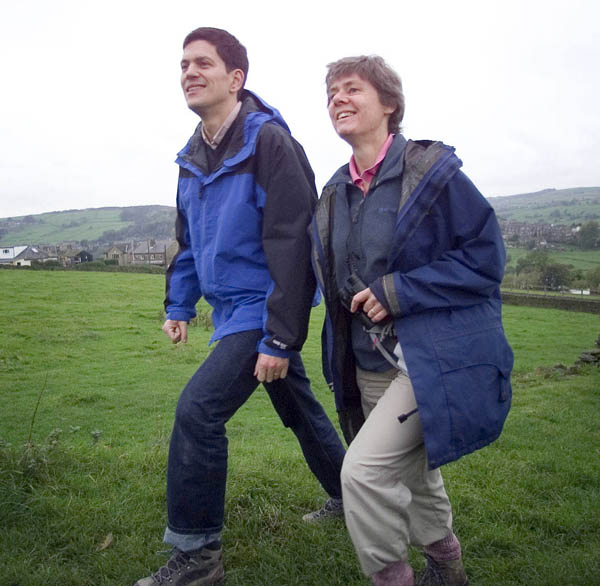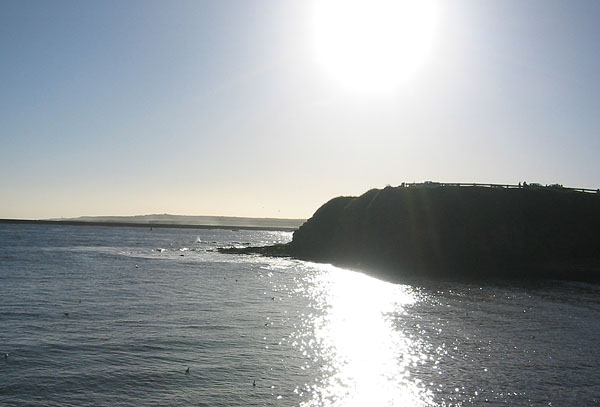 Environment Secretary David Miliband has signalled he will accept Natural England’s proposals to set up a right-to-roam corridor around England’s coastline.
Environment Secretary David Miliband has signalled he will accept Natural England’s proposals to set up a right-to-roam corridor around England’s coastline.
Left: David Miliband and Kate Ashbrook of the Ramblers' Association at the celebration of the first anniversary of the Countryside and Rights of Way Act in West Yorkshire
Mr Miliband, who is being touted by many in the Labour Party as a successor to Tony Blair, will have gained support among many of the party’s traditional supporters, including those in the outdoor movement who see the right-to-roam as central to the party’s manifesto commitment to opening up the countryside.
As the Ramblers’ Association (RA) and other campaigners prepare to celebrate the 75th anniversary of the Kinder Scout mass trespass, which many see as the pivotal event in the long struggle for access to Britain’s wild upland, the Environment Secretary told The Independent on Sunday that he would push through the proposals to create a corridor which would shift automatically inland if coastal erosion occurred – bypassing the mapping nightmare which made the Countryside and Rights of Way Act’s (CRoW Act) introduction so protracted.
Tony Blair himself opposed the CRoW Act, saying voluntary agreements were better than the statutory path.
 Mr Miliband told the newspaper: “England's coastline is a national treasure.
Mr Miliband told the newspaper: “England's coastline is a national treasure.
“It should be the birth-right of every citizen. Many parts of the coast are already accessible but some are not. We want to create an access corridor so that people can walk the entire length of the English coast.”
Right: the English coast at Tynemouth
Amusingly, David Fursdon, president of the landowners’ pressure group the Country Land and Business Association, said: “It is an important birthright to protect the property rights of people who have purchased land at a full market price. When it is devalued by legislation they should be compensated.”
The Government has no plans to compensate landowners affected by the new law. It will issue a consultation paper next month on the best way to introduce the legislation, though Mr Miliband said he favours giving Natural England, the Government agency created last year to deal with outdoors issues, the power to create the new coastal corridor.
The whole process is expected to take ten years and cost up to £50m. Plans are already in place for a Wales coastal path and the Land Reform (Scotland) Act gave access rights to Scottish beaches three years ago. The Ramblers’ Association in Scotland says there should now be a network of paths set up to allow easier access to the coast.
Although the public in Scotland has legal access to the coast, the number of paths is very low, a consequence, according to the RA in Scotland, of the fact that protection of public footpaths that happened in England and Wales in the 1940s was not extended north of the border.
The RA in Scotland says the country has the lowest density of lowland paths of any country in western Europe. The National Farmers’ Union in Scotland is also in favour of the establishment of footpaths. It says if paths are created, walkers tend to stick to them and stay away from machinery and animals.
The introduction of a round-Britain 9,040-mile coastal footpath will face stiff opposition from some landowners and celebrities who have the financial clout to put up a fight for the protection of their privacy. Equally, golf clubs and the military will object to ramblers traipsing across their land.
Conservation groups such as the Royal Society for the Protection of Birds have said they are happy as long as sensible exemptions from access protect sensitive wildlife sites.
Mr Miliband is expected to attend the Kinder Scout mass trespass anniversary in New Mills, Derbyshire on 21 April.
Guest
11 April 2007A nice leg up for Miliband. Hold on a minute. I am a member of the Ramblers, so am I supposed to support the Labour Party, in the lead up to local elections, and take sides a Labour election contest, on the promise of improved coast access, before it has been achieved? This looks very much like jam tomorrow to me. I am a "Green" by the way, so I resent mu vote being taken for granted. Did the RA trustees approve Miss Ashbrook's electioneering photo-opportunity with Miliband? Is Miss Ashbrook a member of the Labour Party by any chance? Is the RA a Labour charity, by any chance? Is Grough a branch of the Labour Party, by any chance?
grough editor
11 April 2007If Guest had taken the trouble to read the picture caption before the steam escaped from his or her ears, he or she would have realised that the picture is from 2006, when Mr Miliband and Ms Ashbrook both happened to be at an event to mark the first anniversary of the full implementation of the Countryside and Rights of Way Act. There was no election at the time, so I hardly think the photo-opportunity, when in fact the Environment Secretary walked a couple of miles to an area of access land in West Yorkshire, could be classed as electioneering. grough is an outdoors news website, which reports what happens in matters concerning the great outdoors. It is not aligned to any political party and takes great delight in picking holes in policies which it doesn't think are in the best interests of users of the UK countryside. grough happens to think that the CRoW Act doesn't go nearly far enough, but that it's a start and that coastal access is a logical progression of the movement to greater access for all to our wonderful countryside. We much prefer the provisions of the Land Reform (Scotland) Act 2003 and would dearly love to see such legislation enacted throughout the UK. That's what we'll be telling any politician who knocks on the doors of grough mansions in the run-up to the elections.
Guest
11 April 2007So, you didn't clear this with Miss Ashbrook or the RA before publication? The RA is officially a charity, and has to avoid perceptions of party bias. Using an old photo doesn't overcome this legal problem for the RA. I would expect Miss Ashbrook and the RA to ask Grough to publish a clarification of some kind, unless there is a common acceptance that Labour is best and charity rules should be ignored for the greater good. Very risky strategy. Non Labour members of the RA take note.
grough editor
11 April 2007grough doesn't need to 'clear' anything with anyone before we publish. It's called freedom of the press and it's one of democracy's pillars. If Ms Ashbrook or the Ramblers' Association want to communicate with grough, they are welcome to use the same channels as 'Guest' or any other reader. However, I suggest ramblings are best kept to the great outdoors, where they belong.